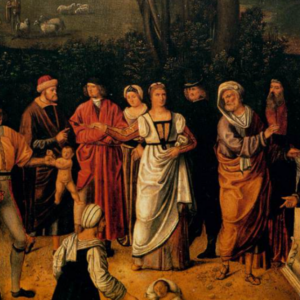Exodus 14–15: From Beheading the Snake to Singing by the Sea (Bible Talk, Ep. 26)
In this episode of Bible Talk, Alex Duke chats with Jim Hamilton and Sam Emadi about Exodus 14–15.
Here, the people of Israel are overjoyed as they move from beheading the snake to singing by the sea.
SHOW NOTES
1:35 / Why does Pharaoh change his mind about the Israelites exiting Egypt?
4:34 / Jim explains the Lord saying, “I will get glory over Pharaoh and all his host.”
6:03 / Even though the Lord has clearly just delivered them from Egypt with overwhelming power, when the Israelites see the Egyptians in hot pursuit of them, they fear.
8:20 / How does Moses deal with Israel’s unbelief?
10:05 / The angel of God and the pillar of cloud stand between Israel and Egypt.
12:11 / Jim connects the Israelites’ march through the Red Sea to other texts in Scripture.
14:01 / Sam says Israel passing through the waters points us back to humanity’s biggest problem.
15:48 / How does the Lord judge Egypt?
18:14 / Sam explains why it’s important that Moses is called a servant in Exodus 14:31.
20:51 / Does Moses’ song in Exodus 15 transition readers to a different literary genre?
23:56 / Sam outlines how Moses’ song begins a new section of the book of Exodus.
27:58 / Israel’s deliverance in the Exodus becomes a pattern for God’s people.
32:43 / Jim walks through the second half of Moses’ song.
38:57 / In Exodus 15:17, Moses says, “You will bring them in and plant them on your own mountain.” What’s significant about this statement?
44:00 / After Moses finishes his song, Miriam starts singing. What does this tell us?
46:11 / What happens after Israel exits Egypt and praises God for delivering them?
47:22 / Why does God lead Israel to a place without water?
48:09 / Is Moses throwing a log into the water that sweetens it a type of Christ?
51:00 / What do we learn about God’s character at the conclusion of Exodus 15?
Image: The Crossing of the Red Sea, Nicolas Poussin, 1634
Related Multimedia

Preacher Mailbag #6 (Preachers Talk, Ep. 74)
By David Helm, Jeremy Meeks, K. Edward Copeland









